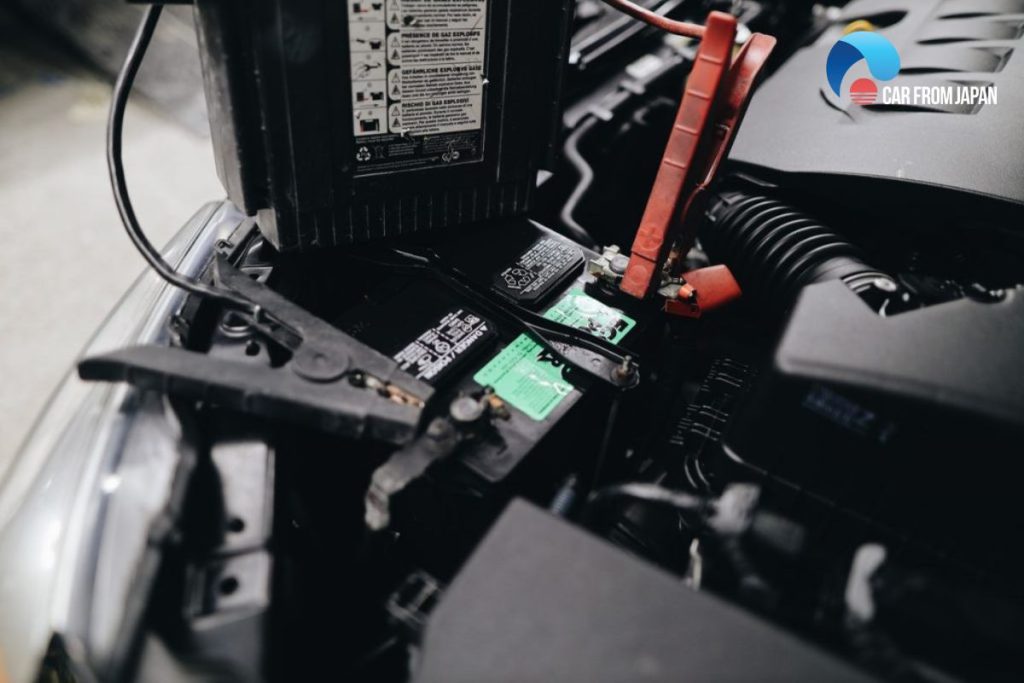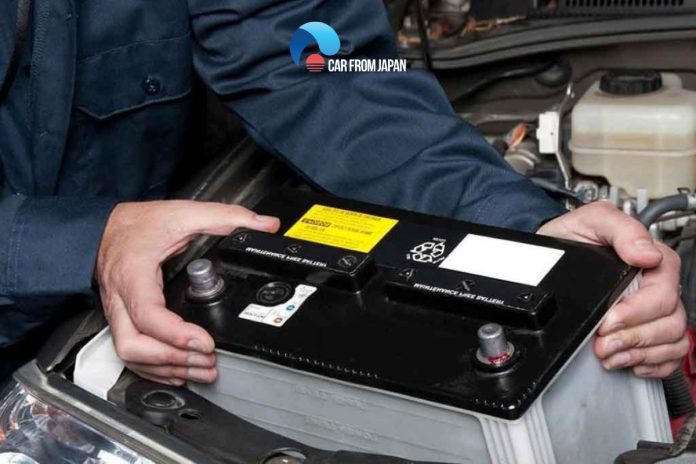Normally, we drivers do not want to disconnect or replace the car battery by ourselves. The reason for this is that there might be various issues related. From electronic modules damage, false warning lights to loss of air conditioning.
The loss of power accessory functions like sunroof, door windows and seats is also related to the car battery disconnect or replacement. For that reason, we need to proceed with caution when performing this task.
Many car designers and carmakers underestimate the danger of battery disconnect issues. Apart from shock hazards warnings on high voltage hybrid batteries, there are no warnings anywhere.
To be more specific, car owners cannot find any battery manufacturers warning signs for customers, as well as telling about possible dangers of replacing or disconnecting a battery. They just only realize it after they have performed the task.
For that reason, our car experts will help you understand the risk and problems when disconnecting or replacing a car battery.
Contents
- The Risk When Disconnecting or Replacing Car Battery
- Loss of Adaptive Memory
- Loss of Steering Angle Sensor Settings
- Loss of Power Window and Power Sunroof Position Settings
- Affect Transmission Shifts and Feels
- Reset or Disable the Anti-Theft System
- Reset the ABS and SIR
- Reset the FMEM
- Reset the Climate Control Module
- Reset the BCM
- Entering the New Battery Info Into the PCM with a Scan Tool
- Loss of Channel Settings on An Electronic Radio and Clock
- How to Safely Disconnect or Replace Your Car Battery?
- FAQs on Car Battery Disconnecting
- Why does my car run rough or idle weird after a battery replacement?
- Why did my Check Engine light or VSC light come on right after replacing the battery?
- Why does my car alarm or horn go off after reconnecting the battery?
- Why won’t my car start even after installing a new battery?
- Why does my key fob or power windows stop working after battery replacement?
- Should I use a memory saver when replacing the battery?
- Why do some cars spark slightly when reconnecting the negative terminal?
The Risk When Disconnecting or Replacing Car Battery
Even though the risk will depend on the make, model, type and year of the vehicle, we gather the most common problems that car owners will face when replacing or disconnecting car batteries.
Loss of Adaptive Memory
The biggest issue when disconnecting the battery on any car that has computerized engine controls is loss of memory.
To be more precise, when you disconnect the battery, the car will lose the voltage to the PCM (also known as Powertrain Control Module), causing it to forget the adaptive memory setting in the KAM (Keep Alive Memory) chip.
For many drivers who do not know this term, adaptive memory has the adjustments the PCM has learned from the beginning of time. They are adjustments for car control functions, transmission shift points and fuel mixture.
And in order to save all the results for the diagnostic self-test that the Powertrain control module runs, we need the Keep Alive memory.
It also stores various fault codes that may have been set, from history codes to freeze frame data that we need for diagnosis.
Doing this forces the engine to run ineffective since the mixture of air and fuel is either too lean or too rich for a period of time until the PCM can relearn to adjust the fuel trim.
As calculated, the learning process will take around several days and 50 to 100 miles of driving until the engine system is back to normal.

Loss of Steering Angle Sensor Settings
The next issue that we might be facing when replacing or disconnecting the car battery is the loss of steering angle sensor settings.
This is the potential risk since it affects our driving experience. The only way to solve this problem is to let the steering angle sensor relearn the procedure.
Loss of Power Window and Power Sunroof Position Settings
If the power is maintained to the electrical system of the car during battery replacement, everything is fine.
However, if it is not, you might not be able to control the power windows as well as the sunroof since the power from these car components are lost.
You need to reset the position values by the car manufacturer’s relearn procedure to solve the issue.
Affect Transmission Shifts and Feels
The next issue we can find is that erasing the PCM’s adaptive memory may also affect the way the transmission shifts and feels. This means disconnecting the car battery is the problem.
To be more specific, car owners cannot have the same transmission as before until either the PCM or transmission control module relearns the shift adjustments.
Car owners must drive for at least 50 to 70 miles in order for the system to learn again.
Reset or Disable the Anti-Theft System
Disconnecting or replacing the car battery can reset a lot of modules, and the most crucial thing that it disables or reset is the anti-theft system.
When this happens, the anti-theft system will think that there is someone trying to steal your cause.
And this forces the engine to not work. In order to solve this issue, you need to reprogram the whole system by the factory scan tool.
Reset the ABS and SIR
Along with that, the SIR (also known as Supplemental Inflation Restraint) and ABS ( short for Antilock Brake System) as well as airbag modules are also reseted.
So in cases when any of these modules needs a reprogramming or relearn procedure after the power has been lost, you might be in trouble. Eventually, it will affect the safety and working system of the vehicle.
Reset the FMEM
FMEM, also known as Failure Mode Effects Management, is the next thing to be reseted when you disconnect or replace a car battery, especially on late model Ford cars.
For new car owners, this module offers an adaptive fail-save strategy. To be more specific, it fixes data or substitutes for missing sensor data.
If you have a bad sensor or are substituting data from the failure mode effects management module for a missing input, this is a huge problem.
Reset the Climate Control Module
Another module that we need to check after disconnecting the car battery is the climate control.
With some cars, this module will not start working until car owners perform a relearn program with the factory scan tool. Imagine having no air conditioner in this weather.
But until we program the module again with the right instruction, there is no climate control module in your automobile.
Reset the BCM
Disconnecting or replacing the car battery also reset the BCM, which is short for Body Control Module.
The same with Climate Control Module, this program will not start operating until we provide it a special relearn or reprogrammed session. And of course, we also need a factory scan tool.
SEE MORE: How To Make Your Car Engine More Efficient And Last Longer
Without the reprogrammed procedure, memory seats, electronic suspension, power sunroof and power windows settings will be messed up.
And the worst part is, as the gatekeeper module on many automobiles from 2003, the body control module is the key feature to communicate with other modules.
When you disconnect the car battery, you are facing the risk of ruining the whole module system in your vehicles.
Entering the New Battery Info Into the PCM with a Scan Tool
In many cases, you need a scan tool in order to replace the battery. To be more specific, the car needs information about the new battery like its types, its serial number as well as its CCA rating.
And this is crucial since the charging system of the automobile is created to raise the rate of charging as the battery ages. However, if the charging rate is not reset back to that, the battery will overcharge, damage and fail.
Loss of Channel Settings on An Electronic Radio and Clock
Last but certainly not least, it makes car owners lose the settings on the clock along with electronic radio. It is really annoying, however, we can fix this by manually resetting them.
How to Safely Disconnect or Replace Your Car Battery?
If this action is so dangerous, how can we safely disconnect the car battery without resetting all the modules? In order to do that, we need to remember one thing: The voltage.
To be more specific, we need to maintain the voltage to the PCM as well as other modules. So how can we do that?

First of all, we can use a 12v backup power supply to the battery cables in order to provide the voltage to the PCM and other modules.
In order to do that, we can plug a small 9 volt battery KAM ( also known as Keep Alive Memory) saver into the cigarette lighter or jumpers to attach another 12v battery to the cables, or.
Drivers must make sure the power receptacle ( the cigarette lighter in this case) is always on. Along with that, make sure we have power when turning the ignition key off.
The price of a plug- in battery memory saver is $20. Also, we can find it at every auto part shop.
Many people might ask, why are we not using a battery charger to keep the memory alive? The answer for this is simple. Usually, some battery chargers have a built-in backup setting for thí purpose.
However, car designers create the ordinary home battery charger just to charge batteries. So it has no backup mode. If we disconnect the battery, the charging current will run through the battery cables and damage a module.
For that reason, we must not use an ordinary battery charger as a battery backup. The exception is when the charger has a backup mode for the battery.
FAQs on Car Battery Disconnecting
Why does my car run rough or idle weird after a battery replacement?
Modern ECUs lose their adaptive memory when the battery is disconnected.
The engine may need time (or a few drive cycles) to relearn idle, fuel trim, and throttle behavior.
Why did my Check Engine light or VSC light come on right after replacing the battery?
When voltage is lost, some systems temporarily lose communication.
These lights often reset themselves after a few drive cycles or a short recalibration process.
Why does my car alarm or horn go off after reconnecting the battery?
The anti-theft system interprets sudden power restoration as a tampering event. Disarming it with the key fob or starting the car usually resets it.
Why won’t my car start even after installing a new battery?
You might have missed a loose ground, corroded terminal, or blown fuse during installation.
Also, some newer cars need an “ignition reset” after power loss.
Why does my key fob or power windows stop working after battery replacement?
Loss of power can desynchronize remote keys or window calibration.
Many cars require a reinitialization sequence (like rolling windows up and holding the switch).
Should I use a memory saver when replacing the battery?
Yes. Connecting a small 12V memory saver via the OBD port keeps ECU and system memory alive during replacement, avoiding many post-install issues.
Why do some cars spark slightly when reconnecting the negative terminal?
That’s normal. It’s the current surge as capacitors in modules recharge.
A large or sustained spark, however, signals a short or parasitic draw!
So now you know several car battery connecting and replacement problems to take notices of. Hope this piece of information will be insightful to you and see you in our next Car maintenance tips!



